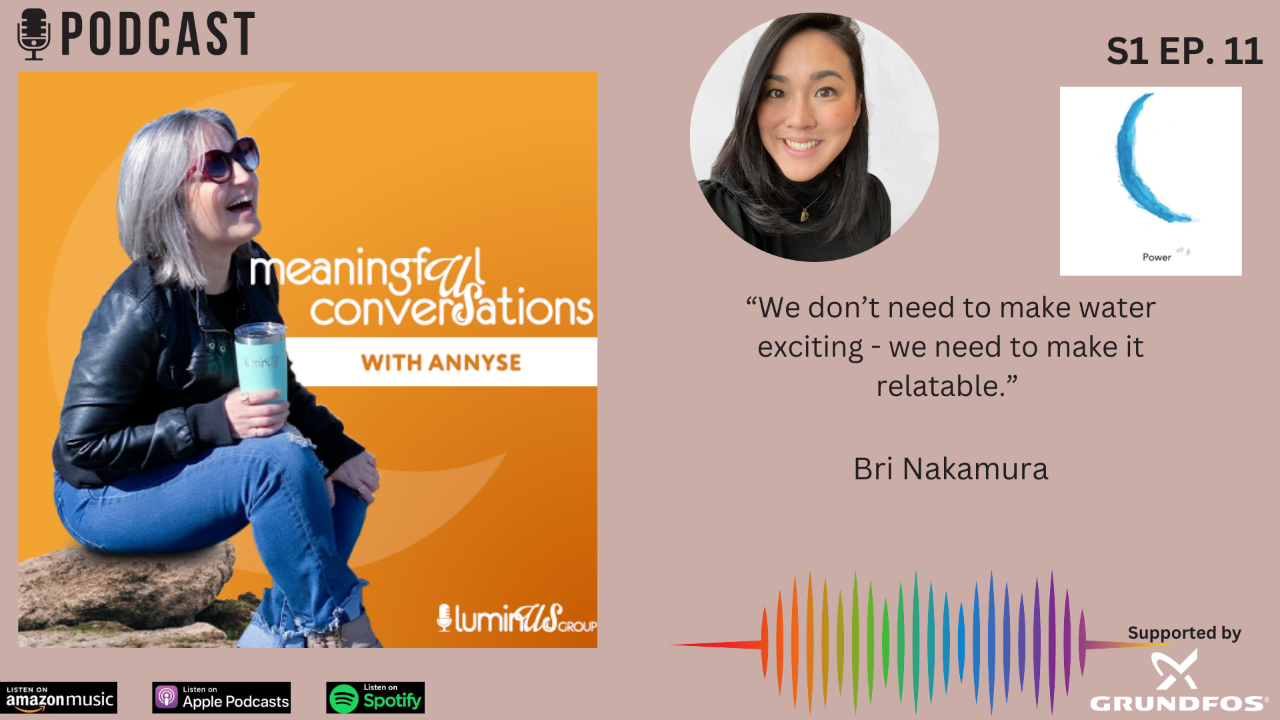Power, Purpose, and the Future of Water: A Conversation with Brianne Nakamura

What does “power” really mean when we think about the future of water? Is it about technology, policy, or infrastructure? Or is it something more personal — about influence, intention, and how we show up every day?
On our latest episode of the Meaningful Conversations podcast, we spoke with Brianne (“Bri”) Nakamura, a second-generation water engineer and Global Product Manager at Xylem’s Pure Technologies brand. Named the Water Environment Federation’s Outstanding Young Professional in 2022, Bri has spent more than a decade at the intersection of innovation, partnerships, and design. Her journey in water has been shaped not just by technical expertise, but also by a deep belief in people, culture, and collaboration.
The “Power” Card: Influence and Intention
When asked to reflect on the word Power, Bri didn’t immediately think of authority or control. Instead, she spoke about individual influence — the subtle but profound ways each of us can shape the culture of our workplaces and the direction of our industry.
Our sphere of influence is so powerful, but we often walk around as if we don’t matter. Power lies in becoming conscious of how we’re being in whatever we’re doing. That creates a ripple effect.
This framing was both humbling and empowering: leadership isn’t just for those at the top. It’s about the daily choices we all make, and the values we model for others.
Culture as a Catalyst
Bri also highlighted the role of team culture in unleashing potential. She’s currently working under a female leader for the first time — an experience she described as deeply empowering, especially in how mentorship and encouragement are woven into the team’s DNA.
A strong culture, she noted, can:
- Motivate people to do their best work
- Normalize asking for help (a big barrier in technical careers)
- Create safe, collaborative spaces — even in remote environments
Individual leaders, Bri reminded us, hold an immense amount of power in shaping this kind of culture.
Bringing the Next Generation Into Water
One of Bri’s passions is future talent. She’s been closely connected to WEF’s InFLOW program (Introducing Future Leaders to Opportunities in Water), which was created to inspire young people — especially those from underrepresented groups — to pursue careers in water.
She pointed out that water isn’t widely taught in schools or engineering programs, meaning many students never realize the breadth of opportunities in this field. InFLOW helps bridge that gap by offering exposure, mentorship, and community-building.
As Bri put it: “Water is a global industry with so many opportunities — but there’s still a huge gap in awareness. We need to make it accessible and relatable.”
Innovation Beyond Technology
When we talk about innovation in water, we often think about new tools and technologies. But Bri reminded us that innovation is also about people and perspectives. By welcoming professionals from outside the water sector, we can spark fresh ways of thinking and accelerate progress.
She challenged us to ask:
- What have others observed about water from the outside?
- What new learnings can they share to drive us forward?
- How can we make water more relatable and human for everyone?
After all, water connects to every life, every community, every joy-filled memory. As Bri said: “We don’t need to make water sexy — we just need to make it relatable.”
Finding Joy in Water
For Bri, one of the most powerful shifts has been rediscovering joy in the water industry. Growing up, she often heard about the challenges her mother faced as a female water engineer. But today, she sees an industry that feels different — one where she has a community, mentors, and peers who lift each other up.
She described an “aha” moment at WEFTEC last year, surrounded by her own supportive “girl squad.” It was a moment of joy, empowerment, and belonging — and a reminder that this is not the same industry she entered 15 years ago.
Why This Conversation Matters
Bri’s reflections remind us that the future of water isn’t only about infrastructure and innovation. It’s about people — their purpose, their influence, and their collective power to shape culture, community, and possibility.
As climate change increasingly reveals itself through water, these human dimensions are more critical than ever. By embracing diverse perspectives, fostering empowering cultures, and reconnecting water to the joy in people’s lives, we can unlock the transformation our industry — and our planet — needs.
